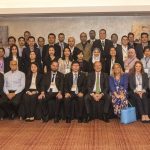MEDIA RELEASE: EU and ASEAN commit towards a circular economy for plastics in the ASEAN Region

Kuala Lumpur, 12 June 2019: The two-day EU-ASEAN regional workshop on circular economy took place in Kuala Lumpur, Malaysia from 11 to 12 June 2019.The workshop, conducted back- to-back with the European Commission DG Environment Circular Economy Mission to Malaysia, emphasised the importance of collaboration between the EU and ASEAN towards a circular economy, and contributed to the EU-ASEAN High-Level Dialogue on Environment and Climate Change. Joint Opening Remarks of the EU-Malaysia Conference on circular economy and the EU-ASEAN regional workshop on circular economy were delivered by Mr. Daniel Calleja Crespo, European Commission Director-General for Environment, and Minister YB Yeo Bee Yin for Energy, Science, Technology, Environment, and Climate Change, Malaysia. The workshop served as an opportunity for the EU and ASEAN to reaffirm their commitment to strengthen cooperation on regional and global environmental challenges.
Circular economy is not just another environment policy, it is not just another climate policy, and it is not another trade policy either. It s all that and more a truly cross-sectoral effort, built around people s needs, and built together with industries and companies like you. said Director-General for Environment, Daniel Calleja Crespo.
Minister YB Yeo Bee Yin underlined that it is important whenever we talk about circular economy, we cannot put the system boundary to the national level it is the global circular economy to be taken into account, and concrete global actions need to be undertaken. Addressing the public and private sector, she added, While governments need to provide incentives and support replacement as 4th R (reduce, reuse, recycle, replace), it is up to the private sector to introduce innovative solutions, or otherwise facing the consequence of being left behind.
Plastic, identified as a key priority in the European Commission Action Plan on Circular Economy, if facilitated and driven by enabling policy frameworks, has the potential to bring new opportunities for innovation, boost countries competitiveness, and create new jobs. A world-wide problem, waste and pollution harm ecosystems and fisheries, fill up landfills, clog urban water systems, contribute to global warming, and have negative impacts on human health. As a hotspot for these issues, Southeast Asia s contribution to plastic pollution of the oceans over the last years has steadily increased. Tackling the problem by addressing changes in policy and legislation on plastics are seen as the most efficient ways to bring solutions. With a longstanding experience on waste management and circular economy, in its recently adopted Plastics Strategy, the European Union has committed to assist other regions in shifting towards a circular economy for plastics. Both regions, ASEAN and the EU, have jointly agreed to collaborate in tackling these issues and bringing solution to the problems.
Under this collaboration framework, the EU and ASEAN Secretariat launched a regional gap-analysis on the state of circular economy for plastics in ASEAN Member States. The analysis, conducted by a team of experts from the Institute for Global Environmental Strategies (IGES) with support from the EU, developed a knowledge base for follow-up actions by the EU to inspire and assist circular economy approaches to plastic issues in the ASEAN region. The importance of facilitating the negotiation of a regional framework agreement and the development of regional circular economy guidelines for plastic pollution, followed by the support to develop technical standards for plastics, recycled plastics, and products made of plastics, were among the main findings presented during this two-day workshop. Overall the findings highlighted the main conclusions from all ten ASEAN Member States, while presenting the EU policy and legislation related to plastics, plastic waste and its promotion of use, and plastic waste regulations. With high participation from EU and ASEAN public and private sector, as well as civil society organisations, the workshop created opportunities for multi-stakeholder engagement in plastic waste management and minimisation, while providing room for discussion on what shall be achieved at the regional level.
Forward looking, the sectoral dialogue on circular economy with ASEAN will be further enhanced through sharing of EU experiences on waste, circular economy and plastic strategy in alignment with the upcoming Partnership Instrument project on marine litter, and in advising interested ASEAN Member States on changes in policy and legislation on plastics, plastic waste and single use plastics.
The workshop was supported by the Enhanced Regional EU-ASEAN Dialogue Instrument (E-READI), a development cooperation program that facilitates dialogues between the EU and ASEAN in priority policy areas of joint interest. Drawing on the EU s experience of regional integration, the E-READI policy dialogue facility further strengthens both the ASEAN regional integration process as well as the overall ASEAN-EU partnership.
______________
The Association of Southeast Asian Nations (ASEAN) was established on 8 August 1967. The Member States of the Association are Brunei Darussalam, Cambodia, Indonesia, Lao PDR, Malaysia, Myanmar, Philippines, Singapore, Thailand and Viet Nam. On 31 December 2015, the ASEAN Community was formally established. The ASEAN Secretariat is based in Jakarta.
For more information, please contact: EU Mission to ASEAN, Programme Manager, Pierre Destexhe Pierre.DESTEXHE@eeas.europa.eu E-READI, Communication & Outreach Expert, Denada Stottele denada.stottele@asean.org






